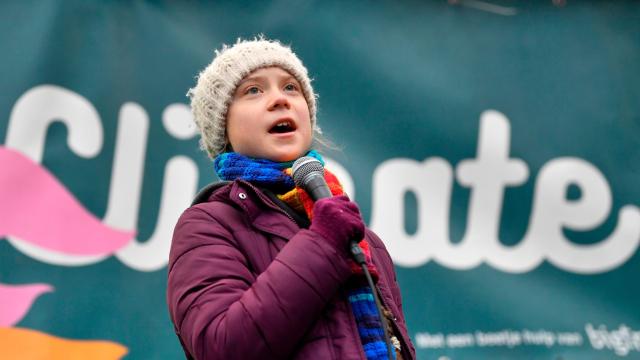For the last two weeks, youth climate organisers in New York have been discussing how climate striking may change now that the novel coronavirus had reached the state. These conversations have been happening elsewhere, too, including in Spain and Belgium. And now Greta Thunberg, the Swedish teen activist that galvanised the global climate strike movement, is calling on strikers around the world to stay home and strike digitally.
“We can’t solve a crisis without treating it as a crisis and we must unite behind experts and science” Thunberg tweeted on Wednesday, echoing one of her common refrains about climate science. “This of course goes for all crises. Now the experts urge us to avoid big public gatherings for a better chance to #flattenthecurve and slow the spreading of the [c]oronavirus.”
COVID-19, the formal name for the virus, has killed more than 4,300 people globally and infected more than 120,000. The World Health Organisation has officially declared the virus a pandemic. The entire country of Italy is under quarantine as of Tuesday. That means no public gatherings, and everyone should stay home. Such measures make total sense in light of how rapidly the coronavirus is spreading, but they definitely make protesting tricky.
Last week, youth strikers with Fridays for Future had planned to attend international climate talks at the European Parliament in Brussels where Thunberg spoke. But the European Union informed them the day before that they could no longer attend due to increased security around COVID-19, Marta Bordons, a 22-year-old climate striker with Juventud Por El Clima in Spain, told Earther.
The rapidly shifting situation has propelled the youth movement built on large gatherings to start thinking of alternatives to in-person events. Shiv Soin, a 19-year-old lead organiser with the New York City Youth Climate Coalition and executive director of the local grassroots group TREEage, told Earther he and his peers haven’t yet decided to end their Friday climate strikes outright. But they may limit weekly participation to only a few people for now. If things worsen in New York, the coalition is prepared to shift strategies. Organisers are still developing contingency plans. Until that’s all sorted out, however, they’re encouraging digital strikes because their current priority is the health and safety of their communities.
We can’t solve a crisis without treating it as a crisis and we must unite behind experts and science.
This of course goes for all crises.Now the experts urge us to avoid big public gatherings for a better chance to #flattenthecurve and slow the spreading of the Coronavirus. 1/4 pic.twitter.com/24o3a7J9ed
— Greta Thunberg (@GretaThunberg) March 11, 2020
“We’re trying to adapt to this situation because we humans have to adapt to the consequences we are facing the same way the government should adapt to the consequences of the climate crisis,” Bordons told Earther.”¨
So what does this look like? It’s certainly not the #DigitalStrike.
That borrows a page from Fridays for Future Digital, which has existed as a social media campaign since November 2019 to support any young adults who are unable to skip school to strike in-person. Every week, the Twitter page posts a theme strikers can post around. Now, it appears more individuals may be joining in digital protest.
Face-to-face planning meetings are also moving online. Many organisers already use Slack, WhatsApp, and other online tools to communicate given the strike movement is global. But the young strikers are still trying to figure out other creative ways they can continue their essential work without convening in large groups.
Their big challenge will come around Earth Day. Major global strikes were planned next month in coordination with Earth Day’s 50th anniversary. That may not be an option anymore if the coronavirus continues to hit cities around the world.
But youth activists will continue to push for real climate action despite the pandemic. Bordons, at least, wishes world leaders would treat the climate crisis with the same urgency they’re giving COVID-19.
“The coronavirus is spreading around the world and we have to be aware, but scientists have been for so long saying that we’re in a climate and ecological crisis, and no one has reacted the way they are reacting for the coronavirus,” Bordons said. “We should also think about that if they are both crises, why can we adapt to one and not to the other?”
